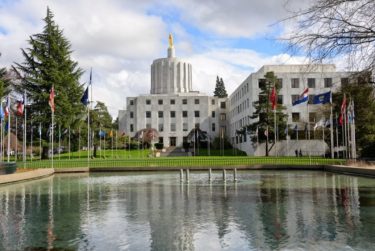OFB priorities for 2018 Oregon Legislature
The 2018 Oregon Legislative Session starts on Feb. 5. From the first gavel drop, Oregon Farm Bureau (OFB) Government Affairs staff will be at the capitol representing the interests of Farm Bureau members and advocating for the unique needs of Oregon agriculture.
OFB Director of State Public Policy Jenny Dresler gives an overview of Farm Bureau’s top priorities for this short session, which will last no more than 35 days.
Take action on OFB priority bills here!
• Oppose cap-and-trade
OFB and other ag organizations urge lawmakers to oppose a cap-and-trade proposal modeled after California’s program. In a nutshell, “cap-and-trade” means setting a statewide limit on greenhouse gas emissions — and requiring the largest carbon-producing companies to purchase or trade credits for the right to release emissions beyond that limit.
But Oregon is already one of the “cleanest” economies in the country, representing less than 1% of the total U.S. greenhouse gas emissions, thanks in large part to the contributions of those working in ag and natural resources. In fact, Oregon’s emissions have decreased 13% since 2003.
“Imposing California’s cap-and-trade program on Oregon will not decrease global greenhouse gas emissions. But it will very likely raise costs for farm and ranch families,” she said.
For example, if the proposal passes, it’s projected to immediately drive up the cost of gas by $0.16 per gallon. When fuel prices increase, so does the cost of ag production, transportation, and distribution.
Farmers and ranchers would also be faced indirect, pass-along costs appearing in higher rates for inputs like fertilizer, equipment, and electricity.
“Cap-and-trade will reduce our competitiveness by levying a new layer of costs onto Oregon ag producers that our counterparts in other states and parts of the world don’t have,” said Dresler
• Support use of mobile handheld devices for safety reasons
A move by the 2017 Oregon Legislature to protect motorists ended up with a surprise for farmers and ranchers.
Legislation to crack down on distracted driving eliminated an appeals court ruling that gave farmers the ability to use two-way radios for work-related communication while operating a motor vehicle.
“There’s a national movement to address the problem of distracted driving. However, Oregon’s bill risks the safety of operators who must move heavy equipment between fields or along public roadways,” said Dresler.
OFB will work with lawmakers and other industry groups to fix this issue and allow for the limited use of radio and handheld mobile devices when engaged in activities that could pose a safety risk for the driver.
• Support making bovine manure tax credit workable
In the 2017 legislative session, OFB joined the Oregon Dairy Farmers Assn. in supporting the restructuring of the bovine manure tax credit.
The bill capped the credit at $10 million per biennium and moved the certification of the tax credit from the Dept. of Energy to the Oregon Dept. of Agriculture.
Unfortunately, the bill passed last year with a wording error that makes it unworkable.
“Due to this drafting error, farmers cannot actually apply for or receive the credit for their manure digesters,” said Dresler.
OFB supports a technical fix to the 2017 bill so farmers can use the credit to offset biomass generation costs.
• Support expanding seed contract protections to growers
Initially brought forward by a specialty seed grower in 2016, OFB supports efforts to expand the grass seed slow-pay, no-pay contracting protections to include all seed growers.
“Legislation was developed by a broad workgroup over the past year,” said Dresler. “The OFB House of Delegates passed a similar policy during the 2016 OFB Annual Meeting.”
Disclaimer: Articles featured on Oregon Report are the creation, responsibility and opinion of the authoring individual or organization which is featured at the top of every article.



